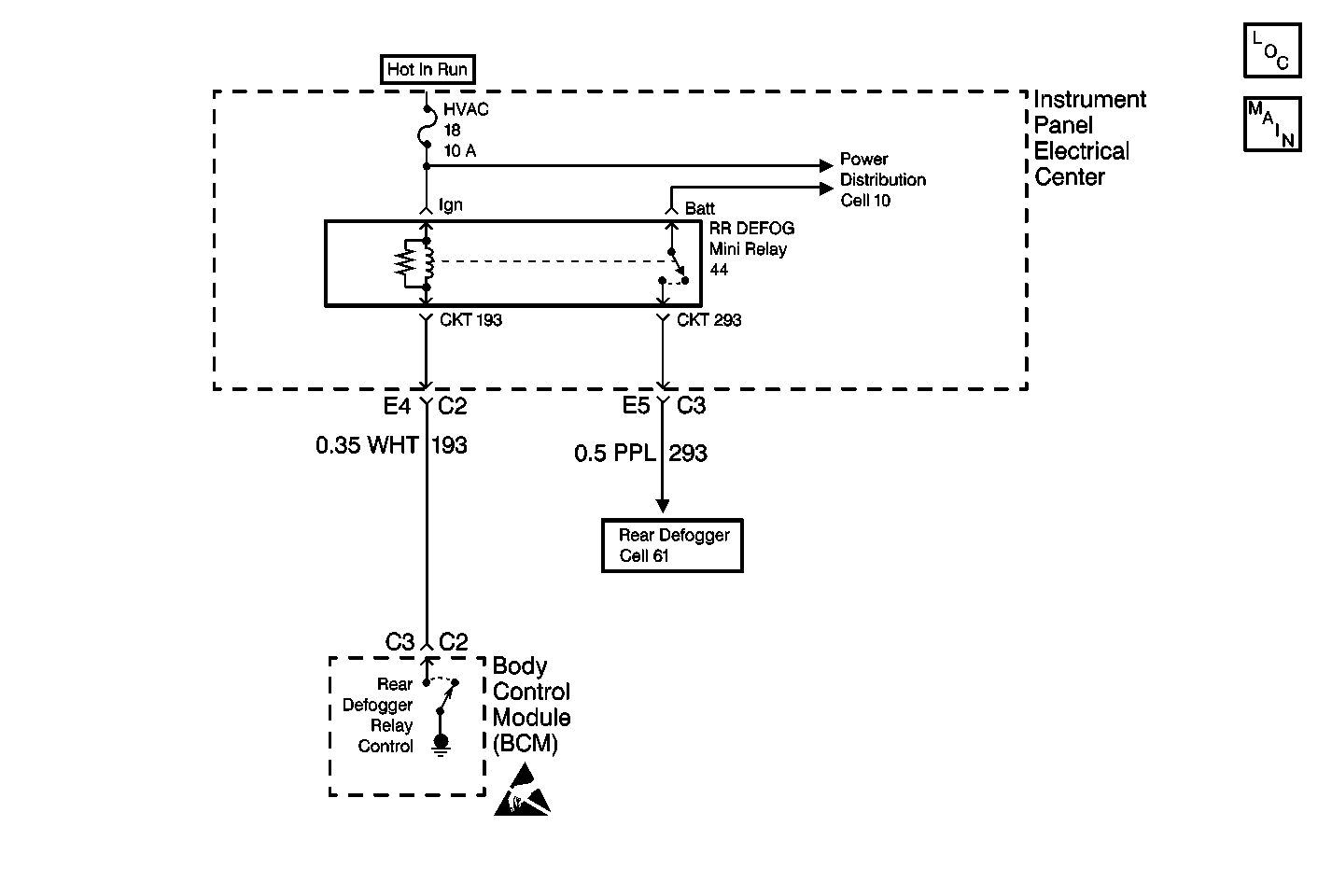
Circuit Description
The BCM must receive a defogger ON request from the rear defogger switch (located in the HVAC control head) with the engine running in order to complete the rear defogger relay circuit. The BCM grounds CKT 193 in order to energize the relay. The BCM monitors the voltage level on the rear defogger control circuit. When the BCM commands the rear defogger relay ON, the voltage level on the control circuit should be low. When the relay is OFF, the voltage level should be high. If the BCM detects a voltage level other than expected, a malfunction is present and a DTC will set.
Conditions for Setting the DTC
| • | The BCM detects a high voltage level (a short to voltage or BCM open internally) in CKT 193. |
| • | The BCM can only test for this condition when the BCM attempts to energize the rear defogger relay. |
| • | All conditions must be present for 2 seconds. |
Action Taken When the DTC Sets
| • | Stores a DTC B0433 in the BCM memory. |
| • | No driver warning message will be displayed for this DTC. |
Conditions for Clearing the DTC
| • | This DTC requires an ignition cycle in order to change from current to history. |
| • | The BCM no longer attempts to energize the rear defogger relay. |
| • | The BCM no longer detects a high voltage level in CKT 193 only when the BCM is attempting to energize the rear defogger relay. |
| • | A history DTC will clear after 50 consecutive ignition cycles if the condition for the malfunction is no longer present. |
| • | Use the IPC clearing DTCs feature. |
| • | Use a scan tool. |
Diagnostic Aids
| • | The following conditions may cause an intermittent malfunction: |
| - | There is an intermittent short to voltage in CKT 193. |
| - | There are poor connections at the BCM, the I/P electrical center, or the rear defogger relay terminals. |
| - | The rear defogger relay is shorted to voltage internally. |
| • | If the BCM is open internally, or if CKT 193 is shorted to voltage, the rear defogger will remain OFF at all times. |
| • | The rear defogger relay may be installed in the I/P electrical center in two directions and still function properly. Refer to Electrical Center Identification Views for relay circuit location. |
| • | If the DTC is a history DTC, the problem may be intermittent. Perform the tests shown while moving related wiring and connectors. This can often cause the malfunction to occur. Refer to Intermittents and Poor Connections . |
Test Description
The numbers below refer to the step numbers on the diagnostic table:
-
This test determines if there is a short to voltage in the rear defogger circuit.
-
This test checks the resistance of the rear defogger relay coil.
-
This test checks for an internal rear defogger relay short.
-
This test checks for an internal rear defogger relay short.
-
This test checks if the BCM can properly control the rear defogger relay by commanding the BCM to ground CKT 193.
-
This test determines if there is an open in CKT 193.
-
This test determines if the BCM is causing the short to voltage.
Step | Action | Value(s) | Yes | No |
|---|---|---|---|---|
1 | Were you sent here from the BCM Diagnostic System Check? | -- | ||
Is the test light ON? | -- | |||
Measure the resistance between the rear defogger relay terminals 1 and 2 (or 85 and 86). Is the resistance within specifications? | 75-105 ohms | |||
Check for continuity between the rear defogger relay terminals 1 and 5 (or 85 and 87). Is there continuity? | -- | |||
Check for continuity between the rear defogger relay terminals 1 and 3 (or 85 and 30). Is there continuity? | -- | |||
Does the test light turn ON and OFF with each command? | -- | |||
Check for an open in the I/P electrical center or in CKT 193. Was a circuit problem found and repaired? | -- | |||
8 | Check the rear defogger circuit for an intermittent malfunction. Refer to Diagnostic Aids. Was a problem found and repaired? | -- | ||
9 |
Does DTC B0433 set as current? | -- | System OK | |
Is the test light ON? | -- | |||
11 | Locate and repair the short to voltage in the I/P electrical center or in CKT 193. Is the circuit repair complete? | -- | -- | |
12 | Replace the rear defogger relay. Is the replacement complete? | -- | -- | |
13 |
Is the replacement complete? | -- | -- | |
14 |
Are all DTCs cleared? | -- | -- |
